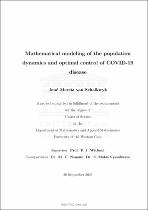| dc.description.abstract | Since the onset of the COVID-19 pandemic, researchers speculated that this virus would create numerous challenges in the daily lives of individuals, especially medical and governmental authorities as they are put under pressure to effectively manage the problem. Previous information gathered by researchers shows that the strain in trying to control this ongoing COVID-19 outbreak is largely due to asymptomatic infectives. This outbreak underlines just how crucial it is to find therapeutics to target this virus so that the spread of the infection and the number of fatalities can be slowed down to reduce the pressure. Further research is being done to determine possible treatments that can be beneficial in controlling the spread of the disease. In this dissertation we construct, analyse and demonstrate the utility of mathematical models of the disease dynamics of COVID-19, and in particular we consider the effect of migrants into and out of the local population, asymptomatic carriers, vaccination, and also effect of the environmental reservoir of the pathogen, the COVID-19 virus (SARS-CoV-2). | en_US |

